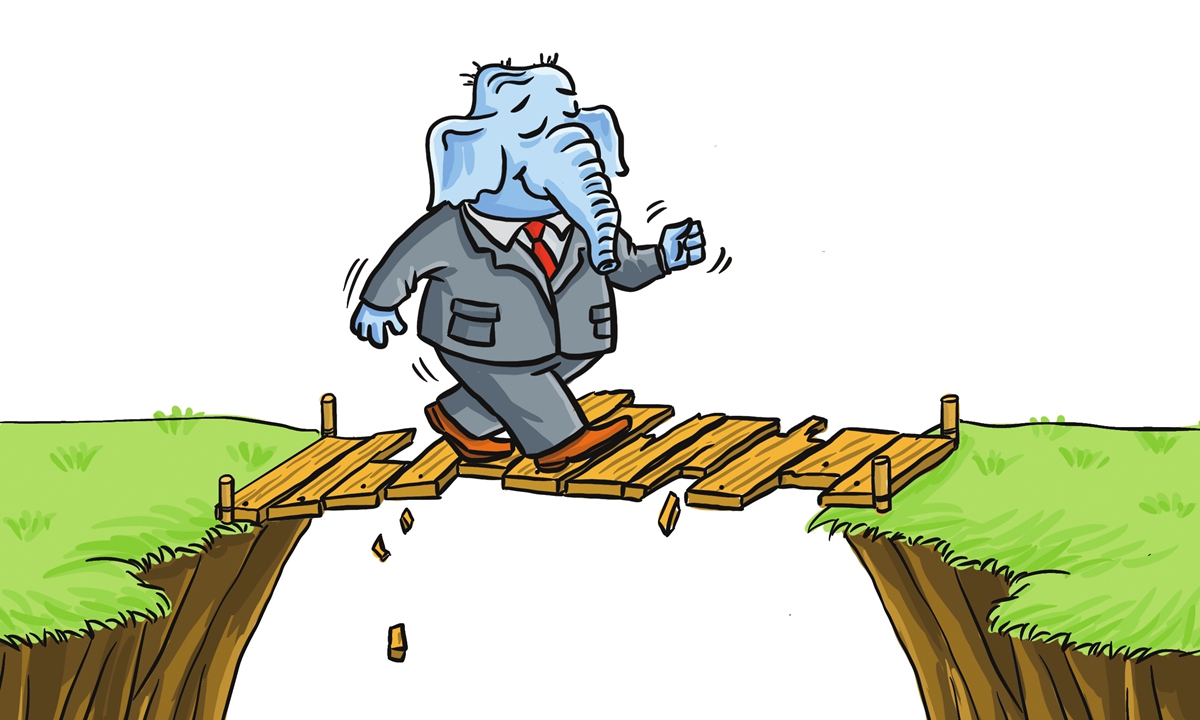It’s too early for New Delhi to talk about India’s economic comeback
By Tian Guangqiang Source: Global Times Published: 2020/12/28 19:08:38

Illustration: Xia Qing/GT
The Reserve Bank of India (RBI) recently forecasted that the latest economic activity indicators suggest the real GDP growth of the South Asian country will go back to positive territory in the October-to-December quarter by edging up a slender 0.1 percent.There are differences between RBI's economic growth calculation method and the international way, and it's understandable that India is anxious to see a positive economic growth, after struggling in a painful contraction for months.
The COVID-19 pandemic has clobbered the Indian economy severely. India is in recession after two successive quarterly GDP contractions, with GDP diving 23.9 percent in the April-to-June quarter, and plunging another 7.5 percent in the July-to-September quarter.
However, as the battered economy remains in dire strait due to the resurgence of the coronavirus, it's still too early for India to read too much into the economy getting back to a considerable recovery.
Even if the Indian economy realized the 0.1 percent year-on-year growth as predicted in the fourth quarter, the prospects of the first three months of 2021 remain bleak, given structural problems with Indian economy and the ongoing pandemic.
India's overall COVID-19 cases exceeded 10.2 million as of Monday. The country's new daily coronavirus infections on Monday stood at 20,021. Although implementing a national lockdown to fight the disease is the last thing the Modi administration wants to do so as not to hurt the struggling economy, there would be no choice for New Delhi if the pandemic caused larger devastating results to the people's health.
The Modi government is anxious to kick-start a recovery, but it seems to have underestimated the difficulties facing Indian economy, in particular the ingrained structural contradictions. Many of Modi government's economic policies were louder than they were efficient with many failing to achieve stated goals.
Failing to tame the pandemic and maintain economic growth, the Modi government is cornered now. Domestic dissatisfaction is surging. It's reported that thousands of farmers from several Indian states have been camping on the outskirts of New Delhi for weeks, rattling the administration.
India's continuous discriminative restrictions against investments and products from China are, purposefully taken to squeeze Chinese companies out of India. In doing so the Modi government is bound to fail in promoting its marketization and modernization drive, especially when it comes to upgrading its backward manufacturing industry, making it more difficult to achieve the goal of boosting economic growth.
Through app bans and other policies aimed to restricting Chinese companies' business in India, the Modi government's another goal is to help local companies to rise and catch up. In addition, in the context of the Trump administration's trade war against China, India hopes to show its support to the US government by intentionally suppressing Chinese companies, in its wish to obtain economic and military assistance from Washington.
In fact, China-India economic relations are mutually beneficial. Affected by the pandemic and de-globalization, the US, EU and Japan are not optimistic about the Indian market, and their interest in investing in India has dropped. However, India's economic development urgently needs infrastructure construction backed up by foreign investment.
In addition, India's decision to restrict Chinese companies' access to its market, which will inevitably diminish New Delhi's bargaining chip with the developed countries, will do enormous harm to the economy.
The author is an assistant research fellow with the National Institute of International Strategy at the Chinese Academy of Social Sciences. bizopinion@globaltimes.com.cn
Posted in: EXPERT ASSESSMENT